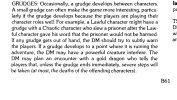Brander
Legendary Pubber
- Joined
- Jun 22, 2018
- Messages
- 283
- Reaction score
- 743
...
Yeah, and yet you keep behaving as if people who say they dislike fudging haven't tried playing with a GM like you...
Let me put it this way: I have, and I have been that GM for other people.
When I consider fudging to be a mistake for the Referee, it's not because I don't know how it works, it's because I know how it works and what it leads to.
...
I'm confident and experienced enough (and have ended up a mostly perpetual GM enough) to know I generally run a good game. I've repeatedly stated that people are free to vote with their feet (which would include not playing because they realize it's not for them) and/or preferably offer to run things their way. They are also free to discuss things after or before the game and if my usual game comments need clarification they are welcome to ask. If taking fudging off the table works best for you, but just because it doesn't work for you or you haven't been able to utilize it to your satisfaction doesn't mean it needs to be off the table for others or that they need to warn others about it.
Bottom line: you're really accommodating. Alas, the thread ain't about gaming accommodations, it's about a specific GMing practice...which a lot of us believe to be mistaken.
I mean, I'm sure you're a swell guy IRL. That doesn't change the specific things we are discussing, though.
I'm not just engaging in the usual pub meandering here. As another example, I only require written waivers when fight Larping because actual injury through normal play is possible (I prefer full contact, full strength fight Larping like Dagorhir). I don't require waivers (written or verbal) when I run my tabletop or online RPGs because there is no potential for harm and I'm not forcing people to play my games. They are there of their own free will and are willing to trust that I will provide a decent experience. Just as they trust I won't poison their food or drive them into trees or charge them for the room even though I got it for free. The very idea that I have to ask if I can or warn before I might maybe at some point fudge the dice is as absurd to me as requiring verbal consent from them before I offer free food, rides, or a place to play. I have some weird food allergies, when I go to someone's place and they offer food, it's on me to check, not them to list out every ingredient beforehand. And if they refuse or don't remember exactly I can just not eat it, go get my own, or go home.
Also, since you are not discussing it with players (as stated above, and as evidenced by the fact that even your daughter doesn't seem to know you're doing it), you don't know whether your players care about the fudging, or they're merely living with it. You're just assuming they're fine with it...
Nice try, but no, I'm clearly being shown that they are willing to trust me to make the game fun (or interesting) without stepping into my space and telling me how I can or can't do it. The idea that I would even need to spell out fudging dice is the odd idea here. You don't trust GMs with that power, so it's on you to play games the specify open rolling (which is the one time the GM should note if they are house-ruling that), talk the GM and see if they will accommodate your request, or run your own games (which it seems you do very successfully). Ditto if you were so arachnophibic that you wouldn't or couldn't play in a game with spiders. Your distaste for GM fudging is a you problem, not an everyone else running games problem.
Also, pretty sure I've never specified whether or not I have personally fudged, though I reserve the right (and it's highly probably I did in my early days learning). My daughter was pretty sure I hadn't. I guess that's irrelevant to you since reserving the power to do it means I might and then it would bother you so much that I might that you couldn't play. And that's fine, you do you, but don't expect others to cater to your peculiar preferences requiring they tell you without you asking. As has been noted open rolling and player-only rolling have become more popular as more people want to limit (or share) GM power. Have fun, and if I run one of those games I'm likely to note if I've house-ruled it or not (I doubt I would run one, but never say never).
Great story, but I suspect the moral might not be what you'd want it to be...!
Now please consider: whenever* I roll dice, it's like having your son rolling for you. Because I roll in the open, and in front of the players.
Which one has the players more worried, how do you think?
The moral of the story is my players trust me (and fear my son's ability to manipulate probability apparently) without ever hinting or bringing up any desire to control how I make the game happen. As have the hundreds of players I've had at my games in the past without ever thinking to bring up the question of fudging. If they have an unusual preference or something that they want they are and have been free to recommend and as you can see I try to be accommodating, but they need to ask.
..
If you'd notice, most of us aren't debating ways to block the GM from fudging, merely the fact that we - as Referees in our own right - consider it a bad idea for any GM.
...but again, even if you are fudging - as long as your players know you are fudging and you don't think it's a bad idea? Knock yourself out, there's more important stuff for a session. (My philosophical disagreement with Brander's ways is merely that he's not warning his players. We're going to keep wasting electrons over it, though, I suspect).
Yeah it's very likely no amount of wading through the electrons is going to convince me that every GM needs to cater to the peculiar and personal desires of people who have GM trust issues. I don't play those games, I don't use those rules, and I don't cater to the idea they get any say in how I do things.
Maybe those people and I can play wargames, board games or card games together where there isn't a GM to distrust. I had a good friend who hated 1st person roleplaying (I still don't understand that), we played wargames together instead (and we played a lot).




 ?
? .
. ?
? .
. . Either way, I'm not prescribing to you how to run games - merely stating that I've seen this thing backfiring).
. Either way, I'm not prescribing to you how to run games - merely stating that I've seen this thing backfiring).





